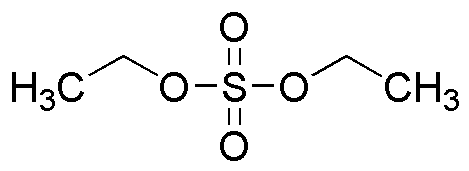Diethyl sulfate is widely utilized in research focused on:
- Organic Synthesis: It serves as a versatile alkylating agent in the synthesis of various organic compounds, making it invaluable in laboratories for creating complex molecules.
- Pesticide Production: This compound is used in the formulation of certain pesticides, helping to enhance crop protection and improve agricultural yields.
- Pharmaceutical Manufacturing: Diethyl sulfate plays a role in the production of certain pharmaceuticals, allowing for the development of effective medications through its alkylation properties.
- Surfactant Development: It is utilized in the synthesis of surfactants, which are essential in detergents and emulsifiers, providing improved cleaning and stability in various formulations.
- Research in Chemical Reactions: The compound is often used in studies related to reaction mechanisms, helping researchers understand the behavior of alkylating agents and their effects on biological systems.
General Information
Properties
Safety and Regulations
Applications
Diethyl sulfate is widely utilized in research focused on:
- Organic Synthesis: It serves as a versatile alkylating agent in the synthesis of various organic compounds, making it invaluable in laboratories for creating complex molecules.
- Pesticide Production: This compound is used in the formulation of certain pesticides, helping to enhance crop protection and improve agricultural yields.
- Pharmaceutical Manufacturing: Diethyl sulfate plays a role in the production of certain pharmaceuticals, allowing for the development of effective medications through its alkylation properties.
- Surfactant Development: It is utilized in the synthesis of surfactants, which are essential in detergents and emulsifiers, providing improved cleaning and stability in various formulations.
- Research in Chemical Reactions: The compound is often used in studies related to reaction mechanisms, helping researchers understand the behavior of alkylating agents and their effects on biological systems.
Documents
Safety Data Sheets (SDS)
The SDS provides comprehensive safety information on handling, storage, and disposal of the product.
Product Specification (PS)
The PS provides a comprehensive breakdown of the product’s properties, including chemical composition, physical state, purity, and storage requirements. It also details acceptable quality ranges and the product's intended applications.
Certificates of Analysis (COA)
Search for Certificates of Analysis (COA) by entering the products Lot Number. Lot and Batch Numbers can be found on a product’s label following the words ‘Lot’ or ‘Batch’.
*Catalog Number
*Lot Number
Certificates Of Origin (COO)
This COO confirms the country where the product was manufactured, and also details the materials and components used in it and whether it is derived from natural, synthetic, or other specific sources. This certificate may be required for customs, trade, and regulatory compliance.
*Catalog Number
*Lot Number
Safety Data Sheets (SDS)
The SDS provides comprehensive safety information on handling, storage, and disposal of the product.
DownloadProduct Specification (PS)
The PS provides a comprehensive breakdown of the product’s properties, including chemical composition, physical state, purity, and storage requirements. It also details acceptable quality ranges and the product's intended applications.
DownloadCertificates of Analysis (COA)
Search for Certificates of Analysis (COA) by entering the products Lot Number. Lot and Batch Numbers can be found on a product’s label following the words ‘Lot’ or ‘Batch’.
*Catalog Number
*Lot Number
Certificates Of Origin (COO)
This COO confirms the country where the product was manufactured, and also details the materials and components used in it and whether it is derived from natural, synthetic, or other specific sources. This certificate may be required for customs, trade, and regulatory compliance.

